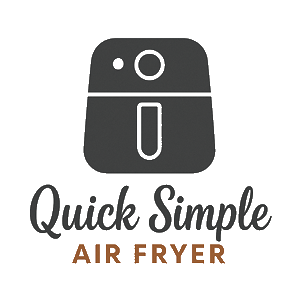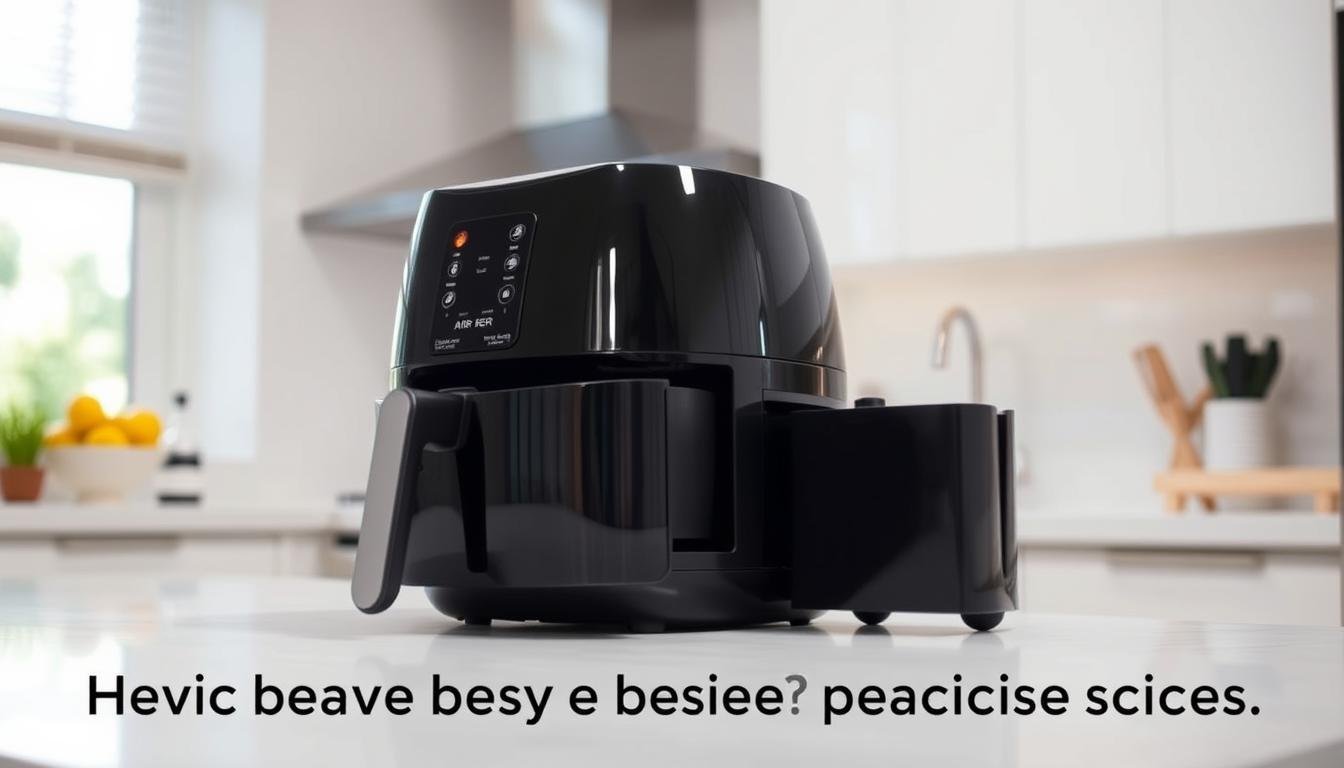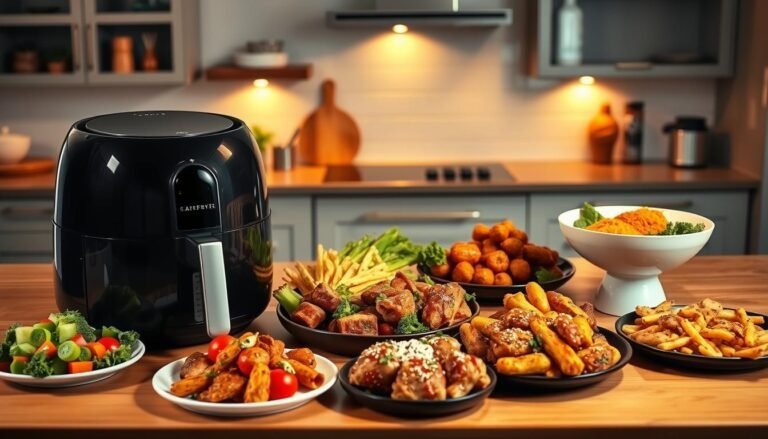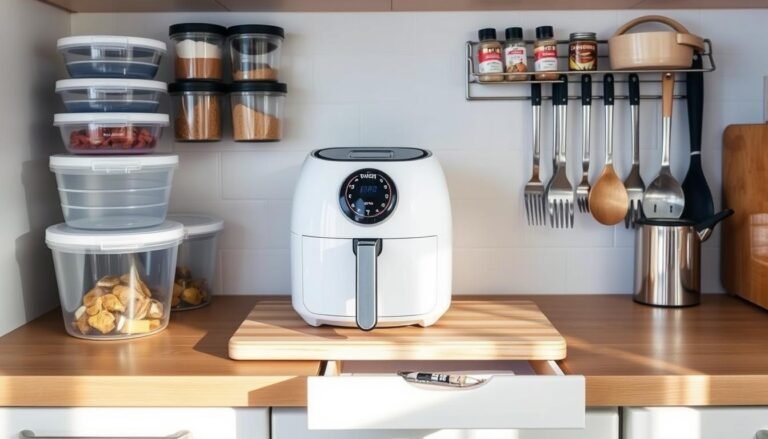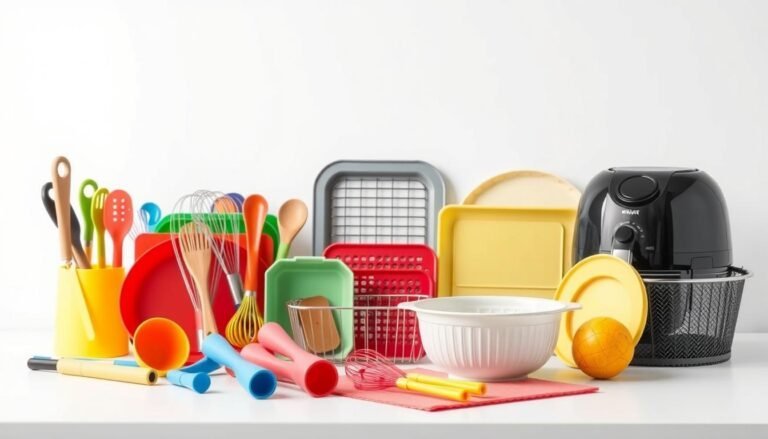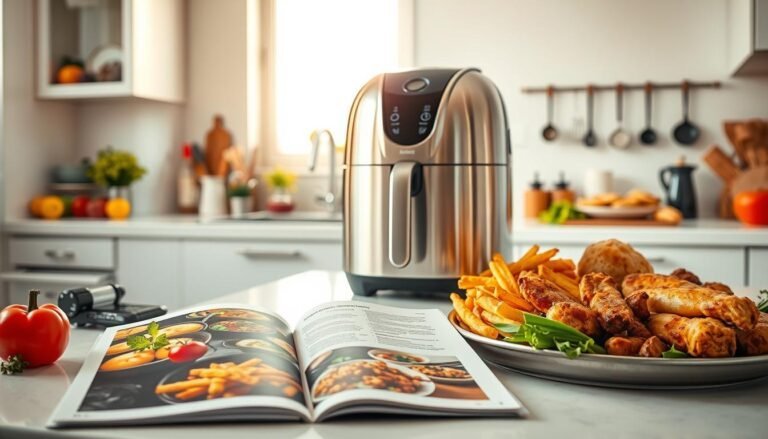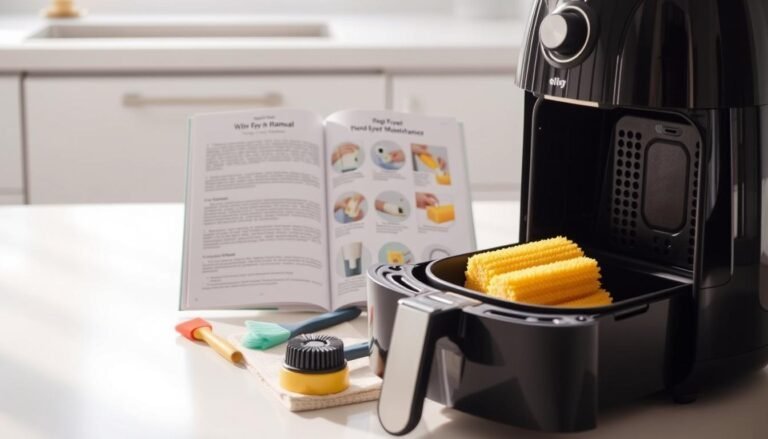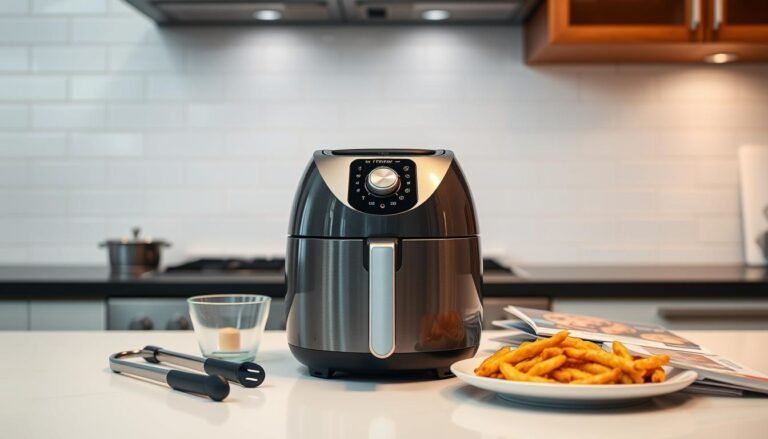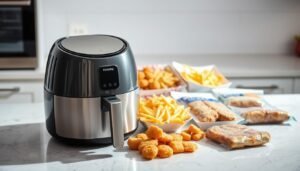Disclosure: This Post Contains Affiliate Links; We earn a commission on purchases.
Using an air fryer is a great way to cook healthy meals. But, you must pay attention to safety to avoid dangers.
Keeping your air fryer clean is key to avoid grease fires and bad smells. As a beginner, following simple safety guidelines is important. It helps you use your air fryer safely and efficiently.
Learning how to use and care for your air fryer is important. It lets you cook tasty meals safely in your kitchen.
Key Takeaways
- Regular cleaning prevents grease fires and unpleasant odors.
- Proper maintenance ensures the air fryer remains efficient.
- Following simple safety guidelines minimizes risks.
- Understanding air fryer usage helps keep your kitchen safe.
- Safe air fryer use enhances your cooking experience.
Understanding Your Air Fryer: Components and Functions
To get the most out of your air fryer, it’s key to know its parts and how they work. This knowledge makes cooking better and keeps your kitchen safe.
Key Parts of an Air Fryer and Their Purpose
An air fryer has several important parts. The basket holds your food, letting hot air go around it. The heating coils make the heat for cooking. The ventilation system keeps the air moving, making food crispy and even.
How Air Fryers Work: The Basics
Air fryers cook food with hot air. When you set the temperature and timer, the heating coils warm the air. The fan then blows this hot air fast around the food, cooking it well.
This method cooks food fast and healthily, unlike deep-frying. Knowing how your air fryer works is key for air fryer cooking safety and getting great results. By understanding it, you can try many recipes and cooking methods, making the most of this kitchen tool.
Air Fryer Safety: Best Practices for Beginners
To have a safe and fun air fryer experience, follow some key steps. Know where to put your air fryer and how to ventilate it. Also, be careful with electrical safety, loading food, and handling hot surfaces and steam.
Proper Placement and Ventilation Requirements
Where you place your air fryer is very important. It should sit on a flat, heat-resistant surface away from anything that can catch fire. Make sure there’s enough space around it for air to move. This helps keep the air fryer cool and safe from fires.
- Keep the air fryer at least 5 inches away from any walls or combustible materials.
- Ensure the area around the air fryer is clear of clutter and kitchen utensils.
- Never place the air fryer near water sources or in humid environments.
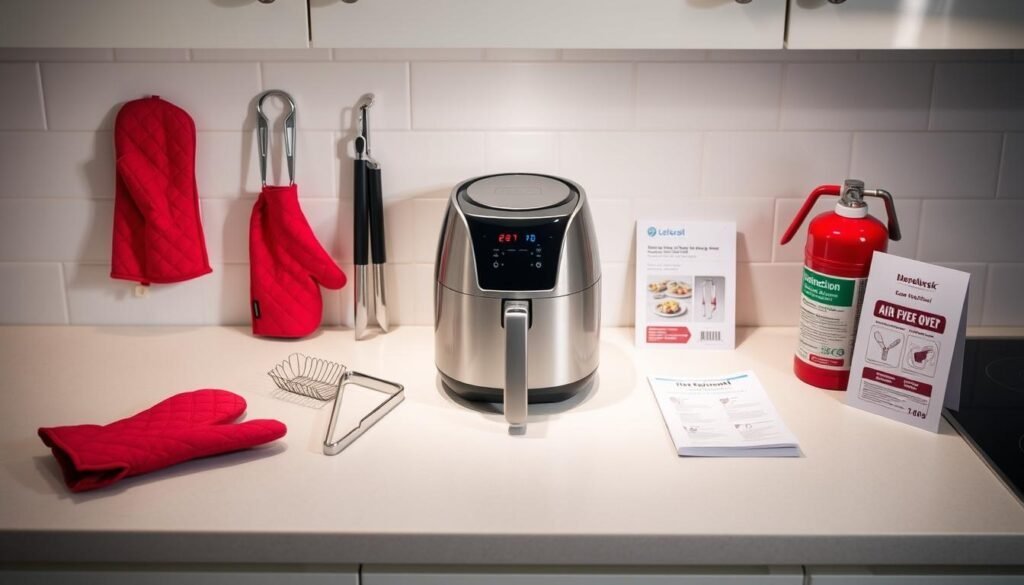
Electrical Safety Considerations
Electrical safety is key when using an air fryer. Don’t overload outlets with too many appliances. Also, keep the air fryer’s cord away from heat and water.
- Use a dedicated outlet for your air fryer to prevent overloading.
- Regularly inspect the air fryer’s cord for any signs of damage.
- Avoid using the air fryer near water or in areas with high humidity.
Safe Food Loading and Capacity Limits
It’s important to load food into the air fryer safely. Always follow the manufacturer’s guidelines for how much food to put in. Too much can cause uneven cooking and even start a fire.
- Do not exceed the recommended capacity of the air fryer basket.
- Ensure food is evenly distributed in a single layer for optimal cooking.
- Shake the basket halfway through cooking to ensure even cooking.
Handling Hot Surfaces and Steam
When using an air fryer, be careful with hot surfaces and steam. The basket and pan can get very hot. Use oven mitts or tongs to handle them safely.
- Always use protective gear when removing the basket or pan from the air fryer.
- Be cautious of the hot air released when opening the air fryer.
- Keep children away from the air fryer while it’s in operation.
Common Air Fryer Hazards and How to Avoid Them
To have a safe and fun air frying time, knowing the dangers and how to dodge them is key. Air fryers are great and healthier than deep-frying, but they can be risky if not used right.
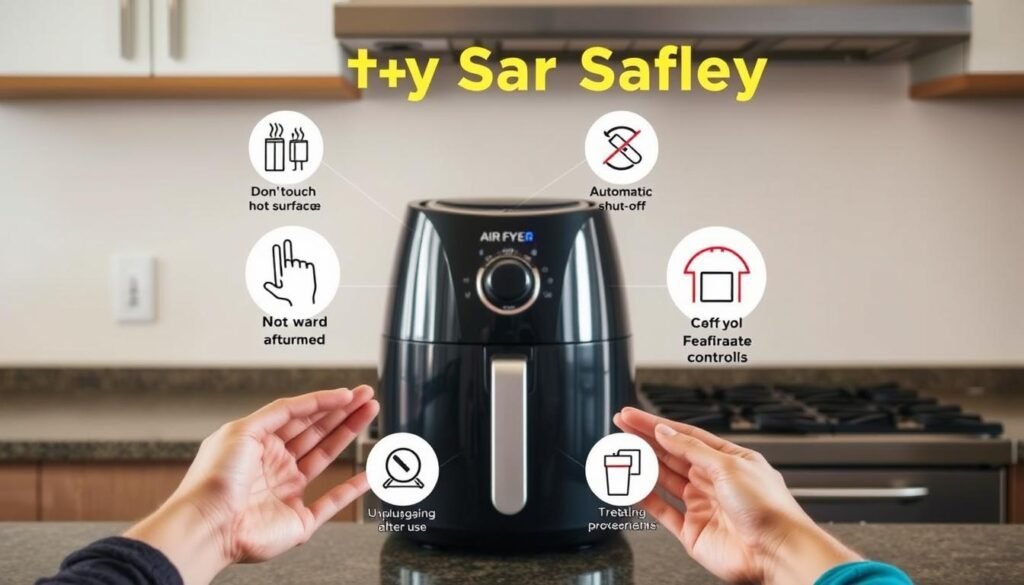
Fire Risks and Prevention
Fire is a big danger with air fryers. It can happen from too much heat, food bits, or broken parts. To stay safe, clean the air fryer often, more so after cooking oily foods. Always follow the maker’s rules for heat and never leave the air fryer on by itself.
Also, make sure the air fryer sits on a stable, heat-safe surface. Keep it away from things that can catch fire like curtains or towels. These steps can really cut down fire risks.
Burn Prevention Techniques
Burns are another big risk with air fryers. The basket and pan get very hot, and steam can burn you when you open the fryer. To avoid burns, use oven mitts or tongs when you handle the hot basket or pan.
- Let the air fryer cool a bit before cleaning or checking on food.
- Be careful when opening the air fryer to avoid steam burns.
- Keep kids away from the air fryer while it’s on.
Food Safety Concerns
Food safety is very important with air fryers. To keep food safe, always wash your hands before touching food. Make sure food is cooked to the right temperature. Don’t pack the basket too full, as it can cook unevenly.
It’s also key to clean and sanitize the air fryer often, focusing on the basket and pan. This stops bacteria from growing. By doing these things, you can make safe and healthy meals with your air fryer.
Maintenance and Cleaning for Long-Term Safety
Keeping your air fryer in good shape is key for its life and your safety. Cleaning and upkeep make sure it works well and stay safe. Here, we’ll talk about how to keep your air fryer in top condition.
Daily Quick-Clean Procedures
After each use, clean your air fryer to stop food buildup. Unplug it and let it cool. Then, wash the basket and pan with soap and warm water.
For hard spots, soak parts first. Use a soft sponge or cloth to avoid scratches. For more cleaning tips, check out this article on cleaning your air fryer.
- Wipe the outside with a damp cloth.
- Use a soft brush to clean the heating element and fan.
- Make sure to clean the air fryer’s vents for good airflow.
Deep Cleaning Schedule and Methods
While daily cleaning is important, your air fryer also needs a deep clean now and then. Every 1-3 months, do a deep clean by:
- Soak the basket and pan in hot soapy water.
- Make a paste with baking soda and water to remove stains and odors.
- Wipe the inside with a damp cloth, focusing on the heating element.
Regular deep cleaning keeps your air fryer working well. It also makes sure safe air fryer cooking techniques by getting rid of grease and food particles that could cause fires or bad smells.
Inspecting for Wear and Damage
Check your air fryer often for wear and damage. Look for frayed cords, damaged basket and pan, and make sure all parts fit right. If you see damage, stop using the air fryer and check the manual for repair or replacement.
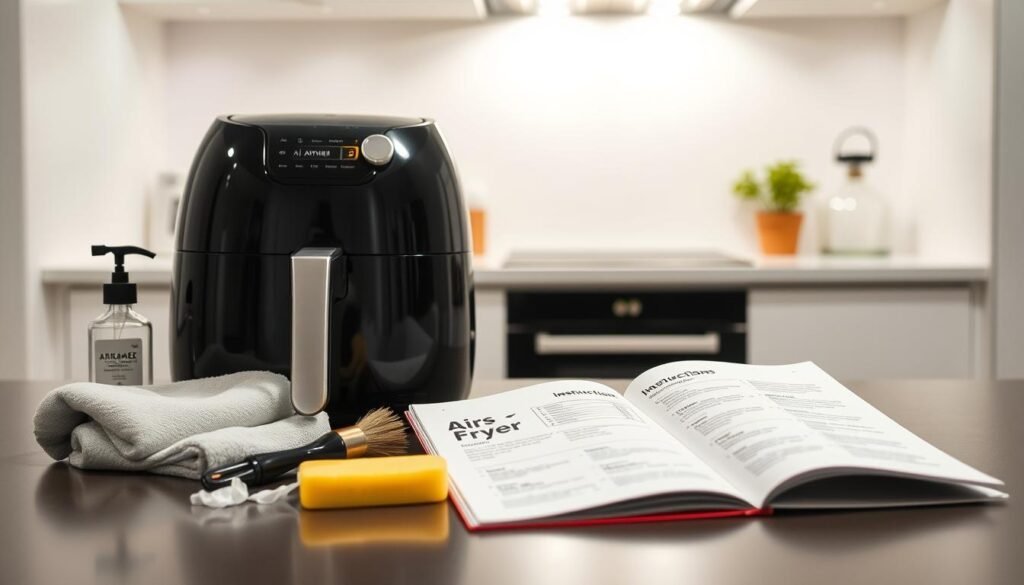
By following these air fryer best practices and using essential air fryer safety tips, you can cook safely and healthily with your air fryer for many years.
Conclusion
Knowing how your air fryer works is key to safe cooking. Make sure it’s in the right place and has good air flow. Also, keep an eye on electrical safety to avoid accidents.
Keeping your air fryer clean is important. Do quick clean-ups every day and deep clean it regularly. Knowing how to prevent fires and burns will make you feel more confident using it.
Follow this guide to cook safely and healthily with your air fryer. Focus on safety and avoid accidents. This way, you and your family will have a great time cooking together.
FAQ
What are the most common causes of air fryer fires?
How often should I clean my air fryer?
Can I leave my air fryer unattended while it’s in operation?
What are the safe ways to handle hot air fryer baskets?
How do I prevent overcooking or undercooking food in my air fryer?
Can I cook multiple types of food simultaneously in my air fryer?
What are the signs of wear and tear on my air fryer that I should look out for?

Ryan Conlon is the creator of QuickSimpleAirFryer.com, where he shares easy tips, tricks, and ideas for getting the most out of your air fryer. Focused on speed, flavor, and simplicity, Ryan helps home cooks make crispy, satisfying meals without the mess or hassle of traditional cooking. Whether you’re new to air frying or looking for fresh inspiration, Ryan’s practical advice makes it simple to enjoy quick, delicious results every time.
Subscribe to Our Newsletter
